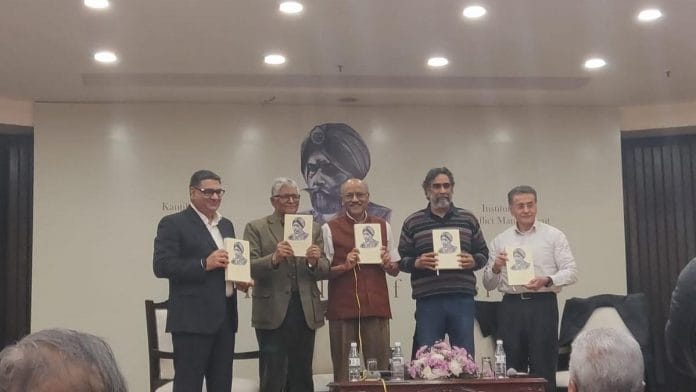New Delhi: Few know that former Punjab police chief Kanwar Pal Singh Gill was a personality who contributed massively to “intellectual literature on terrorism”, said Ajay Sahni, executive director at the Institute for Conflict Management, at the launch of the book The Fragility of Order: Essays in Honour of KPS Gill.
Gill, who had been the director general of police in Punjab twice, was widely credited for breaking the backbone of Khalistani terrorism in the state.
“KPS Gill once said that no commander can ever give a free hand to armed troops…if he does you will have anarchy,” recalled Sahni at the event which was held at the India International Centre in New Delhi Friday.
Other speakers at the launch were Shekhar Gupta, editor-in-chief of ThePrint; Hartosh Singh Bal, political editor at The Caravan; and Satish Jacob, author and journalist.
Sahni is the editor of the book which is a compilation of 18 essays on the emerging challenges of security in an “increasingly uncertain global context”. It includes subjects ranging from terrorism, security, counter insurgency and radicalisation — issues that Gill dealt with, not just during his career but also after he retired.
Also read: Remembering KPS Gill, the superior cop who saved Punjab for India
‘Gill prevented a Kashmiri Pandit-like exodus’
Discussions during the launch ranged from police brutality, insurgencies to strategies of counter-terrorism as well as protests against the Citizenship Amendment Act (CAA), 2019.
In the light of the recent anti-CAA agitations across the country, Sahni said that for Gill “protection of minorities was a central component to law and order”. He also argued that the former police chief’s decision to protect minorities in Punjab during its decades-long insurgency had prevented a “Kashmiri Pandit-like exodus”.
Referring to the alleged police excesses on anti-CAA protesters, especially inside university campuses, the security expert said, “Gill used condign force on his ‘adversaries’. He never used force in excess…it was only used to resolve a problem.”
Bal echoed a similar sentiment. “Gill’s 2002 Gujarat riots experience has been forgotten. The very day that he was brought in as an advisor to the government, the violence and fatalities in the state had gone down.”
According to Gupta, Gill was a “police officer who could think politically and see the larger picture in any situation”. He also recalled how Gill had once said that in case of Operation Blue Star, they should have put the name of police. “People bad mouthed the police anyway…why give the Army a bad name”, Gupta recalled Gill as saying.
Jacob pointed out the difference between Operation Blue Star and Operation Black Thunder. Both were attempts to counter Sikh terrorist organisations seeking refuge inside the Golden Temple in Amritsar. But Blue Star had resulted in many civilian casualties unlike in Black Thunder, he added.
“Gill didn’t want to make the same mistakes that were made during Operation Blue Star,” he added. Jacob also said he was asked to come to the Golden Temple by Gill moments after the encounter got over. “They had surrendered and no one was wounded.”







Gill was butcher who killed and tortured thousands Sikhs . He arrested and tortured families of freedom fighters and worse he arrested , tortured and killed ,Jaswant Singh Khalra , who gathered evidence against the atrocities of Gill and his police,he challenged Gill for a live discussion in front of media,but this coward KPS Gill arrested Khalra, tortured him to a third degree torture and then killed him.You call this bravery ? Even British under their rule did not totured people to this extent.Gill was scared for his life and he is and will be hated by Sikhs in future . He was scared to discuss his atrocities and he did not respect law of the land .He killed thousands of people in false encounters after torturing them ? You call this human ? He was not human at all ?
Gurjeet Singh Samra , Leicester UK